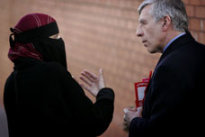 Muslims are being singled out for demonisation on a par with the victimisation of Jews during the last century, the mayor of London claimed today.
Muslims are being singled out for demonisation on a par with the victimisation of Jews during the last century, the mayor of London claimed today.
Unveiling new research indicating that 75% of those polled in the capital support the right of Muslims, and those of other faiths, to dress “in accordance with their religious beliefs”, Ken Livingstone criticised the “barrage” of attacks as an assault on freedom of religious and cultural expression.
His comments coincide with the launch tonight of a high-powered coalition, involving MPs, Muslim groups, trade unions and the campaign group Liberty, to confront Islamophobia. The new coalition is supported by figures from the three major parties, Sikhs, black-led organisations and human rights groups.
Many leading figures are concerned about issues such as Jack Straw’s observations on Muslim women who wear the veil and criticisms from ministers who say Islamic communities should do more to root out extremists.
Mr Livingstone said: “Over recent weeks we have seen a demonisation of Muslims only comparable to the demonisation of Jews from the end of the 19th century. As at that time, the attack on Muslims in reality threatens freedoms for all of us, which took hundreds of years to win – freedom of conscience and freedom of cultural expression. Every person who values their right to follow the religion of their choice or none should stand with the Muslim communities today.”
He linked the criticism of Muslims with the adverse scrutiny accorded to government policy overseas. “I cannot believe it is a coincidence that this entire artificial pseudo-debate has been stirred up at a time when the credibility of the entire war and occupation of Iraq is collapsing before our eyes. Muslims and all of us have a right to call for a different policy within the democratic process.”
See also “Rally calls for religious freedom”, BBC News, 20 November 2006

 The Dutch government said Friday it plans to draw up legislation “as soon as possible” banning full-length veils known as burqas and other clothing that covers a person’s entire face in public places.
The Dutch government said Friday it plans to draw up legislation “as soon as possible” banning full-length veils known as burqas and other clothing that covers a person’s entire face in public places. Commons leader Jack Straw has been the subject of a hard-hitting attack by former home secretary Charles Clarke for starting the national debate on the wearing of the full veil by Muslim women.
Commons leader Jack Straw has been the subject of a hard-hitting attack by former home secretary Charles Clarke for starting the national debate on the wearing of the full veil by Muslim women.